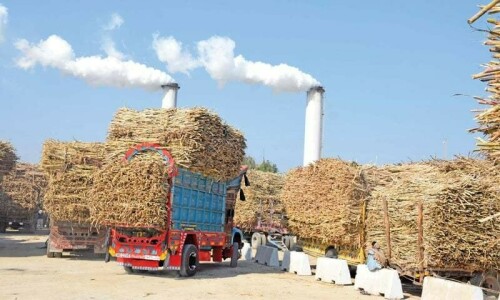Liquid biofuels derived from renewable sources such as edible and non-edible oils and animal fats provide an eco-friendly alternative to traditional petroleum-based fuels. These biofuels can be easily blended with diesel and gasoline (petrol) for use in existing engines, typically up to a certain percentage, without requiring engine modifications.
Among biofuels, ethanol is particularly notable and is produced on a large scale in several countries from energy crops such as maize (corn), sugarcane, rice, barley, sweet sorghum and other biomass materials like straw, grass and wood.
According to the Pakistan Economic Survey, Pakistan’s transport sector consumed approximately 13.6 million metric tonnes (MMT) of petroleum products in the fiscal year 2023-24. To meet this demand, the country imported 5.28 MMT of gasoline and 2.37 MMT of diesel oil during the same period.
The Pakistan Sugar Mills Association (PSMA) reports approximately 90 sugar mills operating in the country, with a total crushing capacity estimated at 6.8m tonnes daily. Pakistan is among the top ten largest sugar-producing countries and utilises molasses, a by-product of sugar-making, to produce ethanol.
Since Pakistan has successfully maintained ethanol export momentum without direct subsidies, establishing distilleries for the sugar by-product could be a lucrative investment
Domestically produced ethanol presents a significant opportunity to reduce reliance on oil imports by blending it with conventional fossil fuels. Producing ethanol from grain requires additional units for grain handling and milling, slurry preparation, and liquefaction.
However, procurement challenges arise due to infrastructural and operational issues, and there is no clear roadmap for higher ethanol blending in Pakistan.
In 2023, Pakistan produced 3.12m litres of molasses and exported 470m litres of undenatured ethyl alcohol at a unit price of $0.64 per litre, resulting in an export value of $302m; around 20 ethanol manufacturing plants, including vertically integrated sugar mills and standalone ethanol units, contributed to this production.
Ethanol is traded as Hydrous Ethanol (containing a minimum of 94 per cent to 96pc ethanol) and Anhydrous Ethanol, which is fuel grade (containing a minimum of 99pc ethanol or higher).
Most distilleries in Pakistan produce 95pc ethanol content and would require enhancement to 99.7pc for blending with petrol (gasoline) in motor engines, necessitating the installation of an additional dehydration unit. Since Pakistan has successfully maintained ethanol export momentum without direct subsidies, establishing ethanol distilleries is a lucrative investment.
Ethanol typically has a lower energy content per unit mass compared to gasoline, which is why vehicles running on ethanol may experience lower fuel economy. However, ethanol is often used as a fuel additive to gasoline (eg E10, which is 10pc ethanol and 90pc gasoline) to improve combustion and reduce emissions.
For a country like Pakistan, high volatility in global oil prices represents a major economic risk, affecting business, agriculture, and manufacturing dynamics. Thus, reducing dependency on imported fuel to the maximum extent possible should be a national priority. Indigenous energy crops like maize and sugarcane offer a promising opportunity if their production and recovery rates are increased.
Pakistan can learn from India’s experience to address energy costs, meet climate commitments and manage the excess production of sugarcane, maize, broken rice and other food grains. India plans to increase its ethanol blending ratio from 10pc to 20pc by 2030 by establishing modern ethanol plants nationwide to convert crops and biomass/waste into ethanol.
The Indian National Policy on Biofuels, updated in 2022, aims to significantly increase biofuel utilisation across energy and transportation sectors by promoting domestic feedstock for production. This initiative seeks to substitute fossil fuels, enhance national energy security, mitigate climate change impacts, and create sustainable employment opportunities.
The policy aims to reduce India’s dependency on oil and gas imports through a five-pronged strategy focused on increasing domestic production, adopting biofuels and renewables, improving energy efficiency, refining processes, and promoting demand substitution.
The Ethanol Blended Petrol Programme is central to this effort, which regulates ethanol prices and utilises damaged and surplus food grains for ethanol production. These measures have not only reduced CO2 emissions but also addressed agricultural overproduction challenges.
Given its similar climate and agricultural patterns, Pakistan could benefit by adopting analogous strategies to leverage ethanol’s environmental and economic benefits.
Once Pakistan establishes a roadmap for biofuel blending in its National Policy on Biofuels, farmers can cultivate energy crops such as sugarcane, maize (corn), sweet sorghum, barley, rice (non-food grade), and oilseeds (mustard, sunflower, and soybeans). These crops are well-suited for biofuel production due to their established agricultural practices, economic significance, and regional suitability, making them common choices in the area.
Establishing a regional agricultural hub in South Asia holds immense potential to bolster food and energy security by leveraging the agriculture sector’s pivotal role in supporting a significant portion of the population directly and indirectly.
This initiative could address challenges by enhancing crop yields and narrowing the gap between potential and current production. However, despite Pakistan’s current hesitance, fostering regional cooperation is essential to unlock shared benefits and tackle common issues such as low GDP growth, high inflation, currency reserves, and unemployment.
The writer is the Pro Vice-Chancellor at Dawood University of Engineering and Technology
Published in Dawn, The Business and Finance Weekly, August 5th, 2024















































